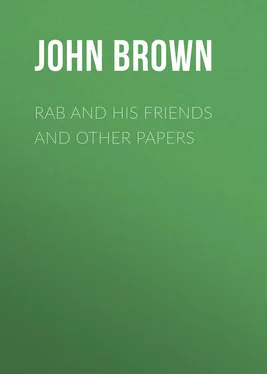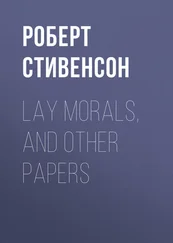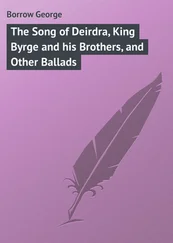John Brown - Rab and His Friends and Other Papers
Здесь есть возможность читать онлайн «John Brown - Rab and His Friends and Other Papers» — ознакомительный отрывок электронной книги совершенно бесплатно, а после прочтения отрывка купить полную версию. В некоторых случаях можно слушать аудио, скачать через торрент в формате fb2 и присутствует краткое содержание. Жанр: foreign_antique, foreign_prose, на английском языке. Описание произведения, (предисловие) а так же отзывы посетителей доступны на портале библиотеки ЛибКат.
- Название:Rab and His Friends and Other Papers
- Автор:
- Жанр:
- Год:неизвестен
- ISBN:нет данных
- Рейтинг книги:5 / 5. Голосов: 1
-
Избранное:Добавить в избранное
- Отзывы:
-
Ваша оценка:
- 100
- 1
- 2
- 3
- 4
- 5
Rab and His Friends and Other Papers: краткое содержание, описание и аннотация
Предлагаем к чтению аннотацию, описание, краткое содержание или предисловие (зависит от того, что написал сам автор книги «Rab and His Friends and Other Papers»). Если вы не нашли необходимую информацию о книге — напишите в комментариях, мы постараемся отыскать её.
Rab and His Friends and Other Papers — читать онлайн ознакомительный отрывок
Ниже представлен текст книги, разбитый по страницам. Система сохранения места последней прочитанной страницы, позволяет с удобством читать онлайн бесплатно книгу «Rab and His Friends and Other Papers», без необходимости каждый раз заново искать на чём Вы остановились. Поставьте закладку, и сможете в любой момент перейти на страницу, на которой закончили чтение.
Интервал:
Закладка:
Well, one day I was walking across the Grass market, with Wylie at my heels, when two shepherds started, and looking at her, one said, "That's her; that's the wonder-fu' wee bitch that naebody kens." I asked him what he meant, and he told me that for months past she had made her appearance by the first daylight at the "buchts" or sheep-pens in the cattle-market, and worked incessantly, and to excellent purpose, in helping the shepherds to get their sheep and lambs in. The man said with a sort of transport, "She's a perfect meeracle; flees about like a speerit, and never gangs wrang; wears but never grups, and beats a' oor dowgs. She's a perfect meeracle; and as soople as a maukin." Then he related how they all knew her, and said, "There's that wee fell yin; we'll get them in noo." They tried to coax her to stop and be caught, but no, she was gentle, but off; and for many a day "that wee fell yin" was spoken of by these rough fellows. She continued this amateur work till she died, which she did in peace.
It is very touching the regard the south-country shepherds have to their dogs. Professor Syme one day, many years ago, when living in Forres Street, was looking out of his window, and he saw a young shepherd striding down North Charlotte Street, as if making for his house; it was midsummer. The man had his dog with him, and Mr. Syme noticed that he followed the dog, and not it him, though he contrived to steer for the house. He came, and was ushered into his room; he wished advice about some ailment, and Mr. Syme saw that he had a bit of twine round the dog's neck, which he let drop out of his hand when he entered the room. He asked him the meaning of this, and he explained that the magistrates had issued a mad-dog proclamation, commanding all dogs to be muzzled or led on pain of death. "And why do you go about as I saw you did before you came in to me?"
"Oh," said he, looking awkward, "I didna want Birkie to ken he was tied." Where will you find truer courtesy and finer feeling? He didn't want to hurt Birkie's feelings.
Mr. Carruthers of Inverness told me a new story of these wise sheep-dogs. A butcher from Inverness had purchased some sheep at Dingwall, and giving them in charge to his dog, left the road. The dog drove them on, till coming to a toll, the toll-wife stood before the drove, demanding her dues. The dog looked at her, and, jumping on her back, crossed his forelegs over her arms. The sheep passed through, and the dog took his place behind them, and went on his way.
RAB
Of Rab I have little to say, indeed have little right to speak of him as one of "our dogs" but nobody will be sorry to hear anything of that noble fellow. Ailie, the day or two after the operation, when she was well and cheery, spoke about him, and said she would tell me fine stories when I came out, as I promised to do, to see her at Howgate. I asked her how James came to get him. She told me that one day she saw James coming down from Leadburn with the cart; he had been away west, getting eggs and butter, cheese and hens, for Edinburgh. She saw he was in some trouble, and on looking, there was what she thought a young calf being dragged, or, as she called it, 'haurled,' at the back of the cart. James was in front, and when he came up, very warm and very angry, she saw that there was a huge young dog tied to the cart, struggling and pulling back with all his might, and as she said, "lookin' fearsome." James, who was out of breath and temper, being past his time, explained to Ailie, that this "muckle brute o' a whalp" had been worrying sheep, and terrifying everybody up at Sir George Montgomery's at Macbie Hill, and that Sir George had ordered him to be hanged, which, however, was sooner said than done, as "the thief" showed his intentions of dying hard. James came up just as Sir George had sent for his gun; and as the dog had more than once shown a liking for him, he said he "wad gie him a chance;" and so he tied him to his cart. Young Rab, fearing some mischief, had been entering a series of protests all the way, and nearly strangling himself to spite James and Jess, besides giving Jess more than usual to do. "I wish I had let Sir George pit that charge into him, the thrawn brute," said James. But Ailie had seen that in his fore-leg there was a splinter of wood, which he had likely got when objecting to be hanged, and that he was miserably lame. So she got James to leave him with her, and go straight into Edinburgh. She gave him water, and by her woman's wit got his lame paw under a door, so that he couldn't suddenly get at her, then with a quick firm hand she plucked out the splinter, and put in an ample meal. She went in some time after, taking no notice of him, and he came limping up, and laid his great jaws in her lap: from that moment they were "chief," as she said, James finding him mansuete and civil when he returned.
She said it was Rab's habit to make his appearance exactly half an hour before his master, trotting in full of importance, as if to say, "He's all right, he'll be here." One morning James came without him. He had left Edinburgh very early, and in coming near Auchindinny, at a lonely part of the road, a man sprang out on him, and demanded his money. James, who was a cool hand, said, "Weel-a-weel, let me get it," and stepping back he said to Rab, "Speak till him, my man." In an instant Rab was standing over him, threatening strangulation if he stirred. James pushed on, leaving Rab in charge; he looked back, and saw that every attempt to rise was summarily put down. As he was telling Ailie the story, up came Rab with that great swing of his. It turned out that the robber was a Howgate lad, the worthless son of a neighbour, and Rab knowing him had let him cheaply off; the only thing, which was seen by a man from a field, was, that before letting him rise, he quenched ( pro tempore ) the fire of the eyes of the ruffian, by a familiar Gulliverian application of Hydraulics, which I need not further particularize. James, who did not know the way to tell an untruth, or embellish anything, told me this as what he called "a fact positeevely ."
WASP
Was a dark brindled bull-terrier, as pure in blood as Cruiser or Wild Dayrell. She was brought by my brother from Otley, in the West Riding. She was very handsome, fierce, and gentle, with a small, compact, finely-shaped head, and a pair of wonderful eyes – as full of fire and of softness as Grisi's; indeed she had to my eye a curious look of that wonderful genius – at once wild and fond. It was a fine sight to see her on the prowl across Bowden Moor, now cantering with her nose down, now gathered up on the top of a dyke, and with erect ears, looking across the wild like a moss-trooper out on business, keen and fell. She could do everything it became a dog to do, from killing an otter or a pole-cat, to watching and playing with a baby, and was as docile to her master as she was surly to all else. She was not quarrelsome, but "being in," she would have pleased Polonius as much, as in being "ware of entrance." She was never beaten, and she killed on the spot several of the country bullies who came out upon her when following her master in his rounds. She generally sent them off howling with one snap, but if this was not enough, she made an end of it.
But it was as a mother that she shone; and to see the gipsy, Hagar-like creature nursing her occasional Ishmael – playing with him, and fondling him all over, teaching his teeth to war, and with her eye and the curl of her lip daring any one but her master to touch him, was like seeing Grisi watching her darling " Gennaro " who so little knew why and how much she loved him.
Once when she had three pups, one of them died. For two days and nights she gave herself up to trying to bring it to life – licking it, and turning it over and over, growling over it, and all but worrying it to awake it. She paid no attention to the living two, gave them no milk, flung them awray with her teeth, and would have killed them, had they been allowed to remain with her. She was as one possessed, and neither ate, nor drank, nor slept, was heavy and miserable with her milk, and in such a state of excitement that no one could remove the dead pup.
Читать дальшеИнтервал:
Закладка:
Похожие книги на «Rab and His Friends and Other Papers»
Представляем Вашему вниманию похожие книги на «Rab and His Friends and Other Papers» списком для выбора. Мы отобрали схожую по названию и смыслу литературу в надежде предоставить читателям больше вариантов отыскать новые, интересные, ещё непрочитанные произведения.
Обсуждение, отзывы о книге «Rab and His Friends and Other Papers» и просто собственные мнения читателей. Оставьте ваши комментарии, напишите, что Вы думаете о произведении, его смысле или главных героях. Укажите что конкретно понравилось, а что нет, и почему Вы так считаете.












